RAILWAYS & WILDLIFE
Transnet scraps ‘temporary’ speed limits to hasten coal exports – but denies link to wildlife carnage
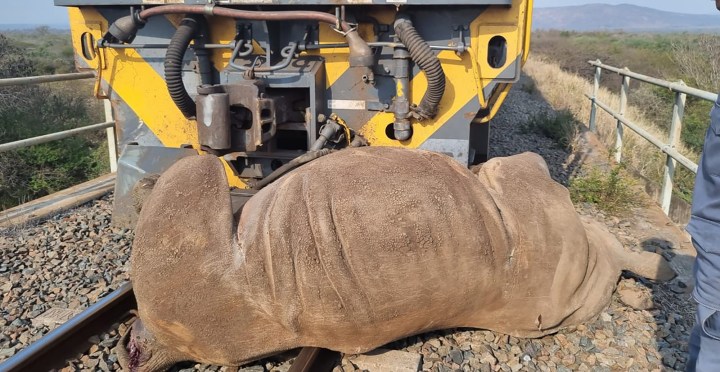
The rail authority claims it hasn’t lifted speed restrictions in the area where several rhinos and other species of wildlife have been killed or injured after being struck by trains recently, but nevertheless says it will erect more warning signs.
Under corporate pressure to speed up coal exports, Transnet has lifted 19 “temporary speed restrictions” on the railway line between Mpumalanga and the port of Richards Bay.
This came to light after Daily Maverick sent questions to Transnet Freight Rail (TFR) requesting clarity on recent comments by a major coal exporter that collaboration between business and Transnet was bearing fruit and that speed limits on this line had now been mostly scrapped.
However, according to a statement by TFR chief commercial officer Bonginkosi Mabaso, no train operating speeds had been revised on the section of track between Golela and Richards Bay in KwaZulu-Natal – where several rhinos and other species of wildlife have been killed or injured after being struck by trains in the Phongola area over recent months.
He also said the changes affected a limited number of “temporary speed restrictions” in specific areas due to “geometric degradation over time” and were not the same as the standard TFR speed limits along the entire route.
Nevertheless, TFR said it was also planning to erect more speed warning signs on some sections of line following a recent spate of wildlife casualties near Phongola.
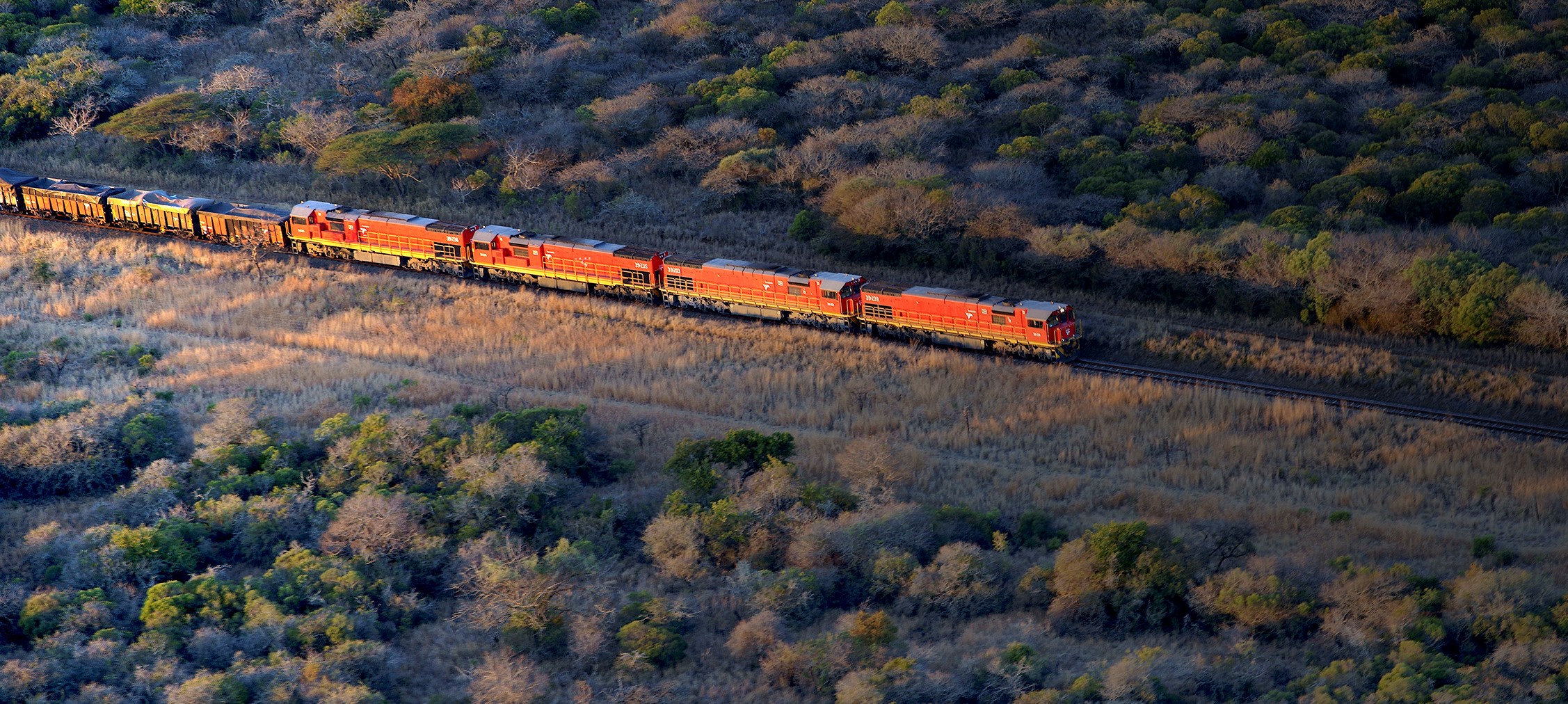
A Transnet freight train travels through a game reserve in northern KwaZulu-Natal, where several wild animals, including rhinos, have been killed in recent train collisions. (Photo: Steve McCurrach / The Bateleurs Flying for the Environment)

A Transnet freight train travels through a game reserve in northern KwaZulu-Natal, where several wild animals, including rhinos, have been killed in recent train collisions. (Photo: Steve McCurrach / The Bateleurs Flying for the Environment)
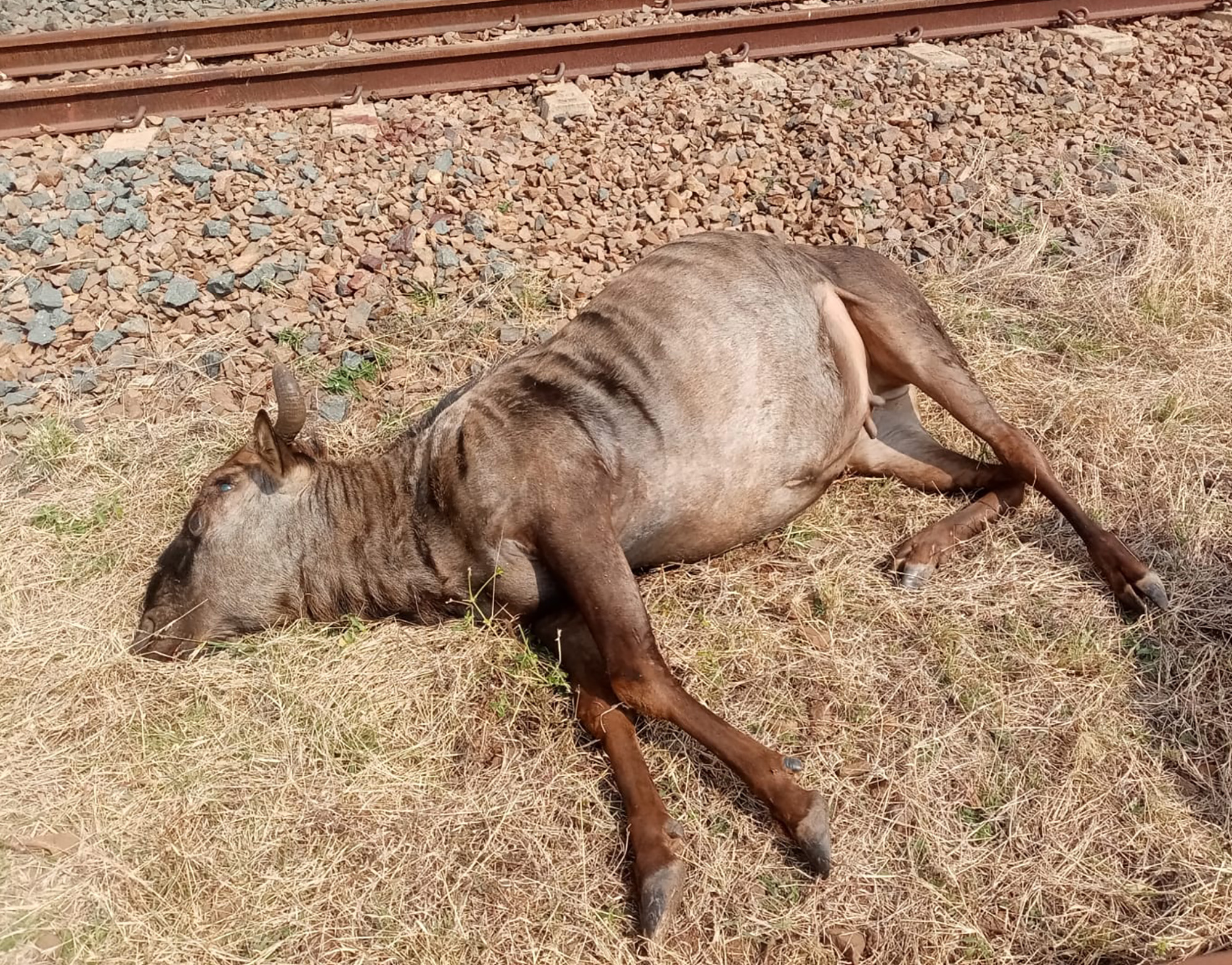
A dead wildebeest next to the train tracks. (Photo: Supplied)
‘Intensified collaboration’
Last week Thungela Resources chief executive July Ndlovu was reported to have told a media briefing that there had been “intensified collaboration” between business and Transnet to improve rail freight movements on the line leading to the Richards Bay Coal Terminal (RBCT).
This collaboration, via a new coal line steering committee and the President’s national logistics crisis committee, aimed to address a number of TFR freight movement constraints.
Thungela, one of the country’s largest thermal coal exporters, holds a 23% indirect interest in RBCT – from where coal is exported to customers mainly in the Far East and Europe. Several of its collieries – including Khwezela, Greenside, Mafube, Zibulo and Goedehoop – are linked directly to the coal export terminal from Mpumalanga, via Swaziland and Hluhluwe.
Writing in Thungela’s latest annual report, Ndlovu noted that – for a number of reasons – coal export volumes on this line had sunk to the lowest level in 13 years.
He said TFR only railed just more than 50Mt to RBCT for the industry in 2022 – nearly 10Mt lower than the minimum annual declared capacity of 60Mt and 20Mt lower than the 70Mt achieved as recently as 2020.
“Thungela was directly impacted by TFR’s underperformance which cost us close to 3Mt in lost rail volumes and ultimately lost export sales. We sought to mitigate this impact on our business by focusing on what we can control.
“Recognising the mining industry’s reliance on properly performing logistics infrastructure, the Transnet board and the Minerals Council South Africa (the Minerals Council) announced in December 2022 that they have agreed to establish joint collaborative structures to work together to ensure that rail infrastructure is stabilised and recovers to normal levels.
“Thungela and other coal exporting parties are working with Transnet to provide joint oversight on the interventions required to stabilise and improve rail performance on the North Corridor that carries coal to RBCT,” he said in his report, dated 26 April.
Elsewhere in the annual report, Thungela noted that the Ukraine invasion had caused severe turbulence in energy markets due to the EU ban on Russian coal.
“Global economies, especially Europe, which is reliant on Russian fuel sources, faced an energy security crisis which resulted in substantially increased demand for alternative energy sources, including thermal coal, in an already severely constrained supply environment … However, we saw increased South African coal flows into Europe – specifically of higher qualities which Thungela was well placed to supply.”
During negotiations last year, Thungela also agreed to a long-term tariff increase for TFR, which in turn agreed to a minimum contractual rail capacity of 60Mt per year.
“Thungela and the industry continue to offer support to Transnet. A steering committee was established in December 2022 which allows for executive collaboration with the Minerals Council, the Transnet board, RBCT and the industry more broadly. The primary goal of this collaboration is to ensure that TFR performance stabilises, and once this is achieved, focus will shift to performance improvement.”
To clarify these issues, Daily Maverick sent questions to TFR, Thungela and the Minerals Council last week, requesting details of the specific locations where speed limits had been eased, along with questions on the implications for public safety, driver/crew safety, wildlife and livestock casualties, derailments or locomotive accidents.
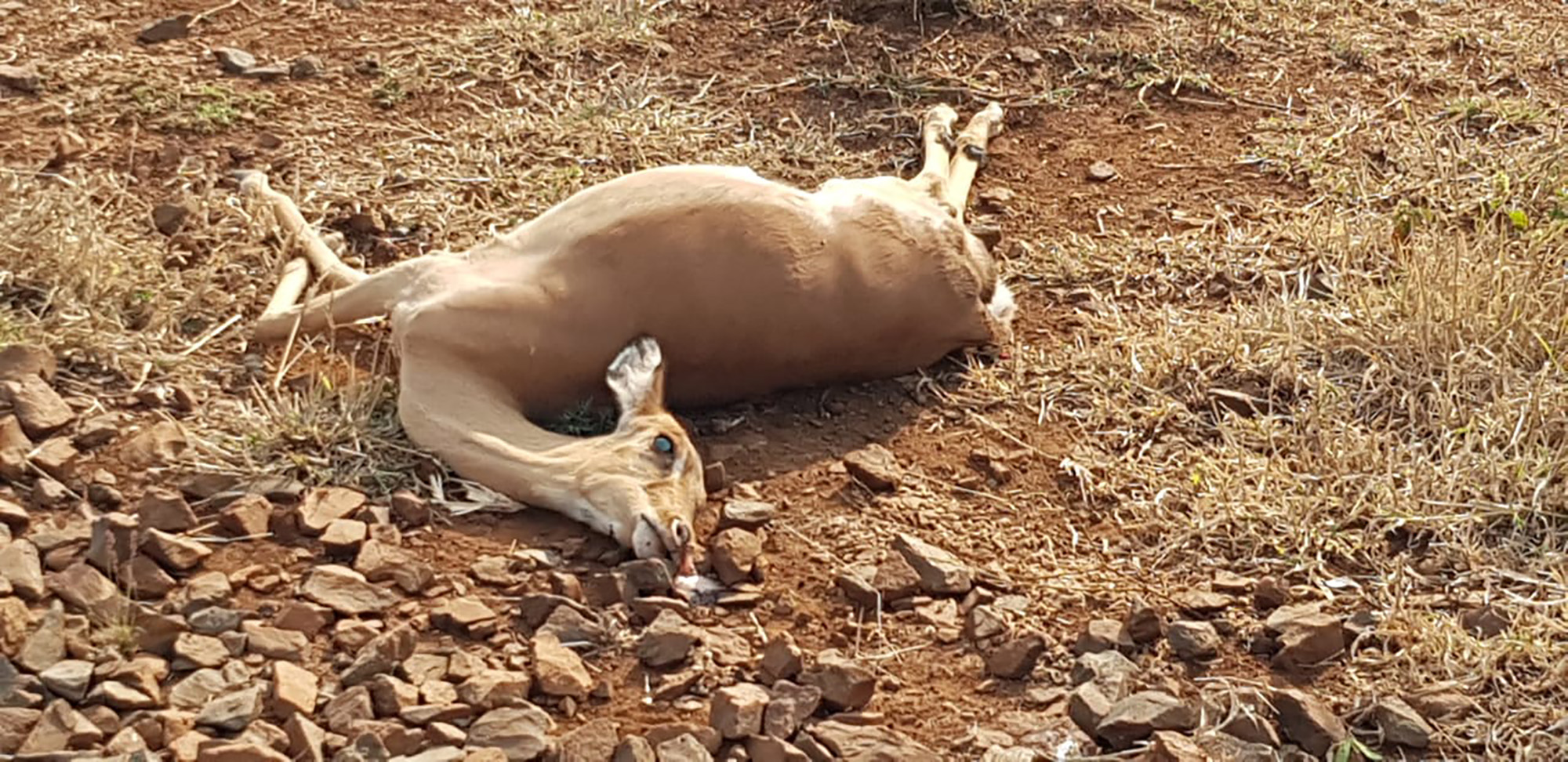
One of several impalas killed by trains in the Phongola Game Reserve. (Photo: Supplied)
‘Subpar rail conditions’
Thungela responded briefly, stating that: “July Ndlovu’s comments related to lifting speed limits previously in place due to subpar conditions on the rail (line). Now that rail maintenance and repairs have been completed, the restrictions have in turn improved and the standard speed limit applies.”
The Minerals Council statement was equally brief, with a spokesperson stating that: “This is largely a TFR operational matter and not one that the Minerals Council is involved in. We don’t have any say or input about the speed of trains or scheduling, which is a purely an operating function of TFR’s management.”
TFR responded in more detail, but without providing the specific locations of 19 track sections where limits had been changed or the new speeds now sanctioned.
In its statement, TFR said it engaged on a regular basis with critical stakeholders along all the routes on which it operated, including local traditional leaders, communities, businesses and establishments such as game reserves.
“For the record, temporary speed restrictions and speed limits are not the same thing. The two should not be confused.”
TFR also conducted speed monitoring regularly, including in game and nature reserves.
“In addition, on-board task observations are carried out by supervisors who travel on the trains to monitor train driver behaviour. Train driver training and refresher training is conducted regularly. If train driver refresher training is not completed on time, and the prescribed steps not taken to remedy the default, a train driver may lose their licence.”
“Following the unfortunate collision of a train with rhinoceros that occurred recently, TFR is embarking on a process to replace and/or erect additional new speed boards at identified points on the Golela to Richards Bay railway line.”
(Significantly, a 40km/h speed limit has been in place in the Phongola area for more than a decade, following the death of a number of black rhino, elephant and other wildlife due to previous train collisions.)
Regarding the statements attributed to Thungela management at a recent media briefing, TFR stated that this “does not relate to the railway line between Golela and Richards Bay, on which the unfortunate collision of a train with rhinoceros occurred”.
Ndlovu’s comments related only to temporary speed restrictions, which were “a precautionary measure taken to reduce the risks of operating trains on infrastructure where (track) defects have been observed.”
“By their nature, temporary speed restrictions are undesired but are necessary to mitigate risks that are inherent to railway operations globally. Once the defects have been addressed or maintenance executed, temporary speed restrictions are removed, and the trains operated at the normal approved section speeds.”
As a result, TFR and its customers recently embarked on a collaborative initiative to accelerate the removal of temporary speed restrictions imposed due to “geometric degradation” over time, so that the heavy haul export coal trains service could be operated at normal approved section speeds.
“By collaborating with TFR, the coal industry customers simply helped to get the work done two months sooner than TFR had planned to do it. Therefore, the statement attributed to Mr Ndlovu is correct regarding the 19 temporary speed restrictions that were removed from the export coal line. However, the statement is not relevant to the Golela to Richards Bay railway line where the unfortunate collision of a train with rhinoceros occurred.”
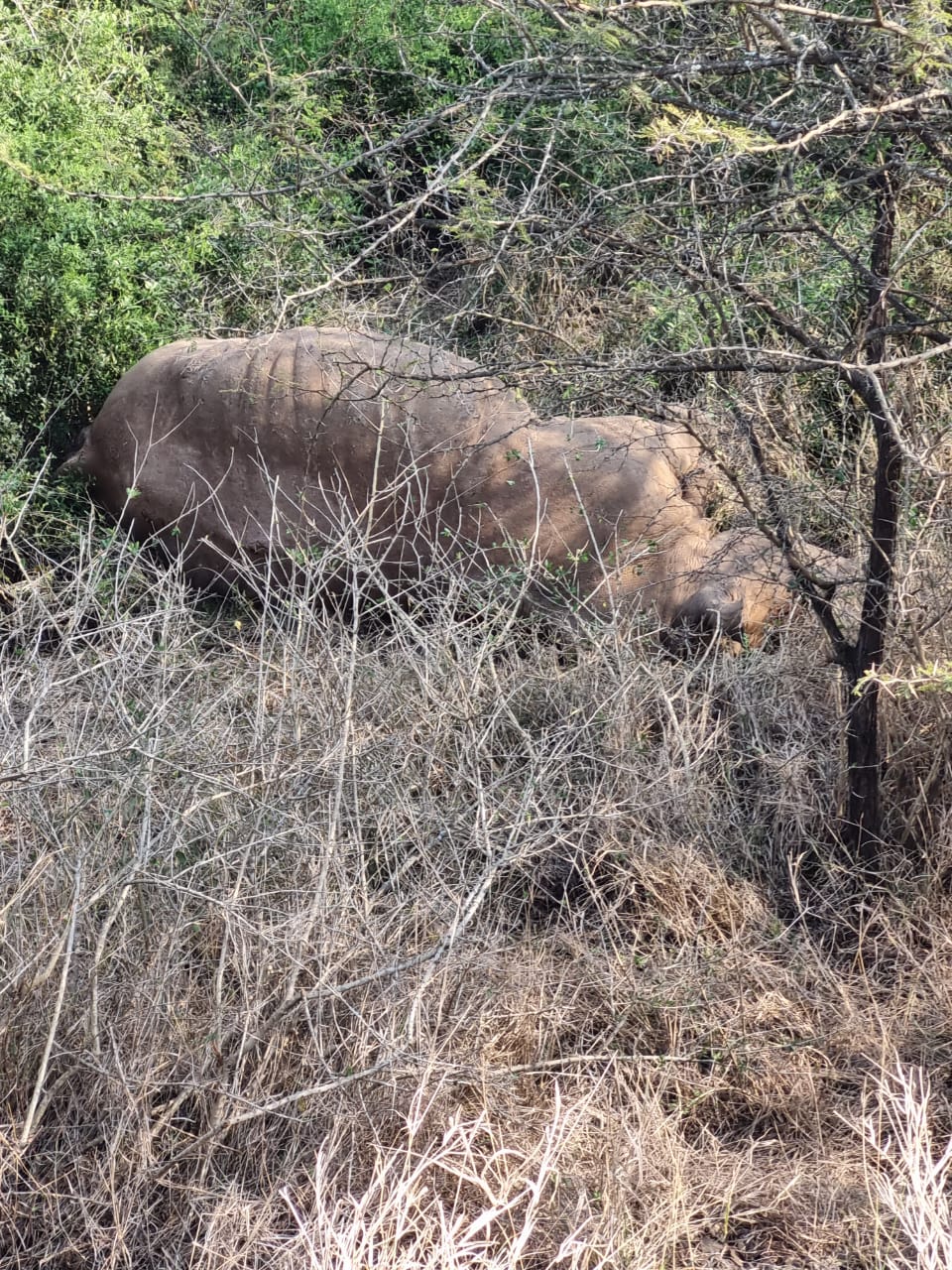
The carcass of a second dead rhino struck by a Transnet freight train. (Photo: Supplied)
Public safety
Regarding public safety issues, TFR said: “Our employees are Transnet’s highest priority. The safety of all operations first and foremost is designed to protect Transnet’s employees, the communities and environments in which Transnet operates, its customers’ cargo, and its infrastructure and assets.”
Approved section speeds and train operating speeds were also determined through complex engineering and scientific processes and were subject to scrutiny by the South African Railway Safety Regulator (RSR).
“The leaders of TFR’s export coal customers on the North Corridor, as responsible South African corporate citizens, acted responsibly in their decision to collaborate with TFR to accelerate the interventions that TFR had in any case planned to execute.”
Nevertheless, according to Phongola Game Reserve landowners Kemp Landman and Dr Heinz Kohrs, there has been a sudden and dramatic increase in deaths and casualties – including rhino, kudu, giraffe, wildebeest and impala over recent months.
Landman and Kohrs both stated that several goods trains appeared to be ignoring the speed limits around Phongola – but they were reluctant to speculate on the underlying reasons for this.
Following a previous series of accidents in which four black rhinos and an elephant were killed by trains more than a decade ago, Transnet agreed to restrict the speed of locomotives to 40km/h along a track section about 30km long in the private Phongola Game Reserve and the adjoining Phongolo Nature Reserve run by the provincial Ezemvelo wildlife authority. DM



















 Become an Insider
Become an Insider
who de horned them?…..
Exactly probably done on purpose
Gonna need a fence. Until then I hope the animals read the warning signs what a splendid idea.